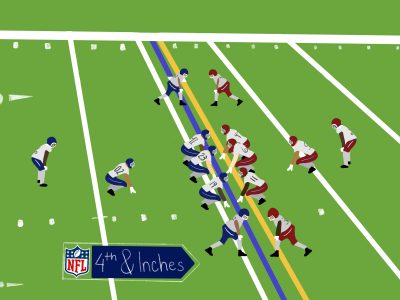It’s hard to build a playoff team in the NFL. Assembling a 53-man squad with the talent and chemistry capable of winning games is a years-long process. The constant flux of player personnel and on-field units throughout a grueling 18-week season adds more challenge.
Notching a playoff berth makes the dedication of players, coaches and team staff worth the countless hours of hard work. However, not all playoff-caliber teams reach the postseason and not every team that makes it deserves to be there.

In the NFL, the four division leaders in each conference are guaranteed a playoff spot regardless of their record. Additionally, the team with the best record in the conference gets a bye week during the Wild Card round.
The fault in this system is that not all divisions are created equally.
For example, the NFC East has the highest combined win percentage in the league. All four teams — the Philadelphia Eagles, Dallas Cowboys, New York Giants and Washington Commanders — boast a winning record.
Because the Eagles (11-1) own the best record in the division, all other NFC East teams have to compete for a Wild Card spot. While it’s likely all four teams will reach the playoffs, it’s not a given.
The Cowboys (9-3) are on track to clinch the No. 5 seed, but the Giants (7-4-1) and Commanders (7-5-1) still have some work to do to solidify their playoff position.
Opposite the NFC East, the NFC South is the worst division in the conference. The 6-6 Tampa Bay Buccaneers lead the division and could see playoff action as the No. 4 seed.
However, every team in the NFC East currently has a better record than the Buccaneers. Even Dallas, with the third-best record in the conference, would have a lower playoff seed than the Buccaneers.
The value placed on winning a division punishes the best divisions and benefits the worst.
Like the NFL, the NBA uses divisions and conferences to group teams. Yet, when it comes to playoff seeding, the two leagues are very different.
In the NBA, the eight teams with the best record in each conference earn a trip to the playoffs. The recent addition of the play-in tournament added an extra layer of competition for the last two playoff spots, but the final playoff bracket is still determined by which teams can win games.
While the NBA postseason isn’t always perfect, it’s unlikely a team reaches the playoffs purely on luck.
The flaws in the NFL playoff seeding extend well beyond the importance of division champions.
Division opponents also play each other twice throughout the season. In a 17-game season where every win is important, this can ruin a good team’s chance at making the playoffs.
At 7-5, the New York Jets are in the midst of one of the franchise’s best seasons in decades. Being in the AFC East, four of the Jets’ 17 games are against the Buffalo Bills and Miami Dolphins — playoff-caliber teams.
The AFC South, home to the Tennessee Titans, Indianapolis Colts, Jacksonville Jaguars and Houston Texans, is one of the worst divisions in the league. The Titans are on track to win the division.
However, the Titans share the same record as the Jets.
The strength of the Jets’ division opponents not only makes their path to the playoffs more challenging but also makes it harder to win more games.
Playoff seeding does consider “strength of schedule” but only applies when two teams with the same record are competing for a Wild Card spot. If the Titans weren’t leading a division and had one more win than the Jets, they would get the playoff nod simply because they had easier opponents.
While abolishing divisions might seem like a simple fix to unbalanced playoff seeding, it would diminish the excitement and intensity of division rivalries. The history of divisional rivalries in the NFL elicits an emotional experience that other professional sports leagues fail to provide.
Although there are blatant flaws with playoff seeding in the NFL, the issue is too complex for a simple solution. Regardless, something needs to change.


















































































































